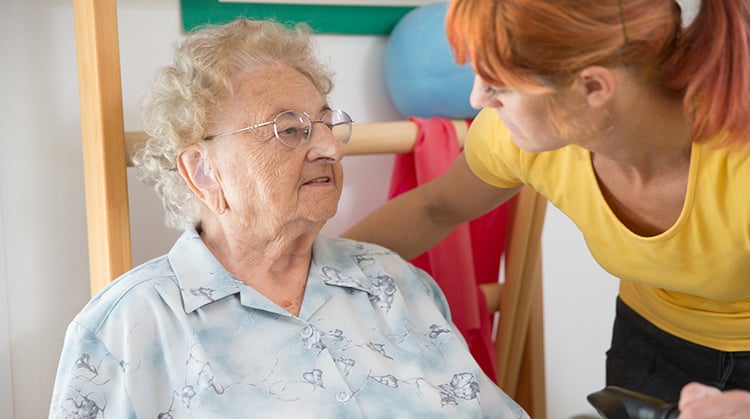Physical Therapy Guide to Alzheimer's Disease
Alzheimer's disease is a condition that damages brain cells. About 10% of Americans aged over 65 years — around 5.6 million people — have Alzheimer's disease. There are also around 200,000 people who are diagnosed with the disease before age 65. The disease causes memory loss and other problems. People with Alzheimer's disease may have difficulty performing simple tasks. Physical therapists work with families to help people with Alzheimer's disease keep moving safely and living their best lives.
Physical therapists are movement experts. They improve quality of life through hands-on care, patient education, and prescribed movement. You can contact a physical therapist directly for an evaluation. To find a physical therapist in your area, visit Find a PT.
What Is Alzheimer's Disease?
Alzheimer's disease is a progressive condition. It damages brain cells and affects how we speak, think, move, and deal with other people. It can lead to a decline in memory and the ability to perform daily activities.
Alzheimer's disease is the fifth leading cause of death among American adults aged over 65 years.
The risk of getting Alzheimer's disease increases with age. People rarely develop the disease before age 60. Most people with the disease do not have a family history of it.
CAUTION: One of the major symptoms of Alzheimer's disease is confusion. However, there are several other possible causes of confusion.
- If confusion comes on suddenly, see a doctor or a neurologist immediately.
- If confusion occurs or gets worse after a fall or a head injury, call 911.
Signs and Symptoms
There are 10 warning signs of possible Alzheimer's disease:
- Memory changes that disrupt daily life.
- Difficulty making decisions, especially in planning or solving problems.
- Difficulty completing familiar tasks.
- Confusion about time and/or place.
- Trouble understanding visual images or the way things fit together (spatial relationships).
- Finding the right words to say when speaking or writing.
- Misplacing items and losing the ability to retrace your steps.
- Poor or decreased judgment about safety.
- Withdrawal from work or social activities.
- Changes in mood or personality.
People with Alzheimer's disease may get lost in once-familiar places. In the later stages of the disease, they might get restless and wander. Often, this restlessness happens in the late afternoon and evening (called "sundowning"). They may withdraw from their family and friends or see or hear things that are not there. They may falsely believe that others are lying, cheating, or trying to harm them.
Along with these "cognitive" symptoms, performing simple tasks may become difficult in the later stages. Ultimately, they may need help eating, bathing, toileting, and dressing. People with Alzheimer’s disease are usually able to walk until the very last stage of the disease. They might, however, lose strength and balance, which can lead to an increased risk of falls.
How Is It Diagnosed?
The exact cause of Alzheimer's disease remains unknown. It is likely due to many factors that make diagnosis difficult. There is no single test for Alzheimer's disease. Health care providers who are trained to work with older people may notice the early signs. It may take days or weeks for the medical team to complete a set of tests to make a diagnosis.
Researchers are getting closer to making a diagnosis by using brain imaging. Scans that may help with diagnosis include a CT scan, an MRI, a PET scan, or ultrasound. These tests can show abnormal brain structure or function. Mental-function tests and other tests also may be used.
Physical therapists may recognize early signs or symptoms of the disease. If a physical therapist suspects Alzheimer's disease, he or she will make a referral to a specialist.
How Can a Physical Therapist Help?

Physical therapists are in a great position to help people age well. Research shows that:
- Physical activity can improve brain function and memory. This is true for healthy older adults or for those with mild cognitive problems.
- Regular exercise may delay the onset of Alzheimer's disease in healthy older adults.
- Regular exercise may delay a decline in the ability to perform tasks in people who have Alzheimer's disease by improving their strength, balance, and walking ability.
Physical therapists are movement experts. They design exercise programs for people with a variety of health conditions, including Alzheimer's disease. They can play a key role in preventing decline.
In the early and middle stages of Alzheimer's disease, physical therapists help people stay mobile. With this help, people can continue to perform their roles at home and in the community.
In the later stages of the disease, physical therapists can help people keep doing daily activities for as long as possible. This reduces the burden on family members and caregivers. They can instruct caregivers and family on how to improve safety and manage their loved one’s needs. Through a home assessment, physical therapists can help make the home safer. Physical therapy can help improve quality of life and may delay the need for facility-based care.
People with Alzheimer's disease develop other conditions related to aging. These can include arthritis, falling, or broken bones. Physical therapists pay close attention to how the disease can affect these other health conditions.
Physical therapists are trained to use a variety of teaching methods, techniques, and unique approaches to treating people with Alzheimer’s disease, including:
- Sight, sound and touch cues. The physical therapist may use sight cues, such as raising both arms to get a person to stand up. Verbal cues are short, simple, spoken instructions. Touch cues might include taking someone's hand to get them to walk.
- Mirroring. The physical therapist serves as a "mirror" to show an individual how to move. For example, to help the person raise his or her right arm, the physical therapist would raise his or her left arm.
- Task breakdown. Physical therapists can break down tasks into short, simple step-by-step "pieces." This technique can be used, for example, to teach a person how to safely move from lying in bed to sitting in a chair.
- Hand-over-hand guidance. The physical therapist takes the patient’s hand or touches another body part to guide them through a motion.
- Muscle training. To help someone walk safely, the physical therapist can train a person’s muscles to "learn" to respond to changes like uneven or unstable surfaces.
Training Family Members and Caregivers
Family members may need instruction on how to safely move, lift, or transfer someone with Alzheimer's disease. Physical therapists can instruct caregivers on how to prevent injury to themselves and to the person with the disease. In addition to hands-on care, physical therapists teach people how to use equipment and assistive devices. Individuals may learn how to use equipment such as:
- Special seating.
- Canes.
- Long-handled reaching tools (reachers).
Can This Injury or Condition Be Prevented?
Many research studies have found that physically-active people (compared with inactive people) are less likely to have mental challenges (cognitive decline or dementia) as they age. This is also true in later life. Some research says that increased fitness of the heart and lungs might even prevent aging (wasting away or atrophy) of the brain. Your physical therapist can design an exercise program to help you improve your odds of healthy aging.
What Kind of Physical Therapist Do I Need?
All physical therapists are prepared through education and experience to treat conditions and injuries. You may want to consider:
- A physical therapist with experience treating older adults and age-related symptoms and conditions. Seek out those who regularly work with patients with dementia and their caregivers. Some physical therapists focus on geriatrics (treating older patients).
- A physical therapist who is a board-certified specialist in geriatric physical therapy, or who completed a residency or fellowship in geriatric physical therapy. This physical therapist has advanced knowledge, experience, and skills that may apply to Alzheimer’s disease.
You can find a physical therapist with these and other credentials by using Find a PT, an online tool built by the American Physical Therapy Association. Search for physical therapists by location and experience.
General tips when you are looking for a physical therapist (or other health care provider):
- Ask family, friends, and other health care providers to recommend a physical therapist.
- Ask about their experience working with people with Alzheimer's disease or dementia before you make an appointment.
- Be prepared to describe symptoms in as much detail as possible, and say what makes the symptoms worse.
Additional Resources
In addition to seeking out a physical therapist for assistance, there is a wealth of resources available to patients, families, and caregivers through the Alzheimer's Association. There is also a 24/7 helpline at 800-272-3900 to answer questions or identify resources like support groups that might help you.
If you or your loved one are aged 50 years or older, you may choose to participate in an online Alzheimer's study. Information about all ongoing clinical trials is available here.
The American Physical Therapy Association believes that consumers should have access to information that could help them make health care decisions and also prepare them for their visit with their health care provider.
The following articles and links provide some of the best scientific evidence related to medical diagnosis and physical therapy treatment of Alzheimer's disease. The articles report recent research and give an overview of the standards of practice both in the United States and around the world. The article titles link either to a PubMed* abstract of the article or to free full text. You may want to bring a copy of an article with you to your health care provider.
Alzheimer's Association. https://alz.org/professionals/health-systems-clinicians.
Dawson N, Judge KS, Gerhart H. Improved functional performance in individuals with dementia after a moderate-intensity home-based exercise program: a randomized controlled trial. J Geriatr Phys Ther. 2019;42(1):18–27. Article Summary in PubMed.
Klatt BN, Ries JD, Dunlap PM, Whitney SL, Agrawal Y. Vestibular physical therapy in individuals with cognitive impairment: a theoretical framework. J Neurol Phys Ther. 2019;43:S14–S19. Article Summary in PubMed.
World Health Organization. Reducing the Risk of Cognitive Decline and Dementia: WHO Recommendations. Front Neurol. 2022 Jan 10;12:765584. Article Summary in PubMed.
Blackwood J, Martin A. Screening for cognitive impairment as a part of falls risk assessment in physical therapist practice. J Geriatr Phys Ther. 2017;40(4):197–203. Article Summary in PubMed.
Sobol NA, Hoffmann K, Vogel A, et al. Associations between physical function, dual task performance and cognition in patients with mild Alzheimer’s disease. Aging Ment Health. 2016;20(11):1139–1146. Article Summary in PubMed.
Staedtler AV, Nunez D. Nonpharmacological therapy for the management of neuropsychiatric symptoms of Alzheimer’s disease: linking evidence to practice. Worldviews Evid Based Nurs. 2015;12(2):108–115. Article Summary in PubMed.
Ries JD, Hutson J, Maralit LA, Brown MB. Group balance training specifically designed for individuals with Alzheimer disease: impact on Berg Balance Scale, Timed Up and Go, Gait Speed, and Mini-Mental Status Examination. J Geriatr Phys Ther. 2015;38(4):183–193. Article Summary in PubMed.
* PubMed is a free online resource developed by the National Center for Biotechnology Information (NCBI). PubMed contains millions of citations to biomedical literature, including citations in the National Library of Medicine’s MEDLINE database.
Expert Review:
Nov 26, 2019
Revised:
Nov 26, 2019
Content Type: Guide
Alzheimer's Disease
PT, DPT, board-certified clinical specialist in geriatric physical therapy
Cognitive and Mental Health Special Interest Group
of APTA Geriatrics, an academy of the American Physical Therapy Association
You Might Also Like...
Podcast
Alzheimer’s Disease: Physical Therapy’s Role in Preserving Physical FunctionNov 11, 2021
Many of us have seen the sad, steady march of Alzheimer’s disease in friends or loved ones. Can people with advancing dementia benefit from physical therapy
Podcast
Benefits of Physical Therapy for People with Alzheimer's DiseaseJul 30, 2019
Research shows that regular exercise actually can improve memory in people with Alzheimer's, and delay symptoms in those who have the disease but haven't
Health Tips
9 Things Your Physical Therapist Wants You To Know About Aging WellSep 28, 2018
With the right type and amount of physical activity, we can help stave off many age-related health problems. These nine tips from physical therapists will


